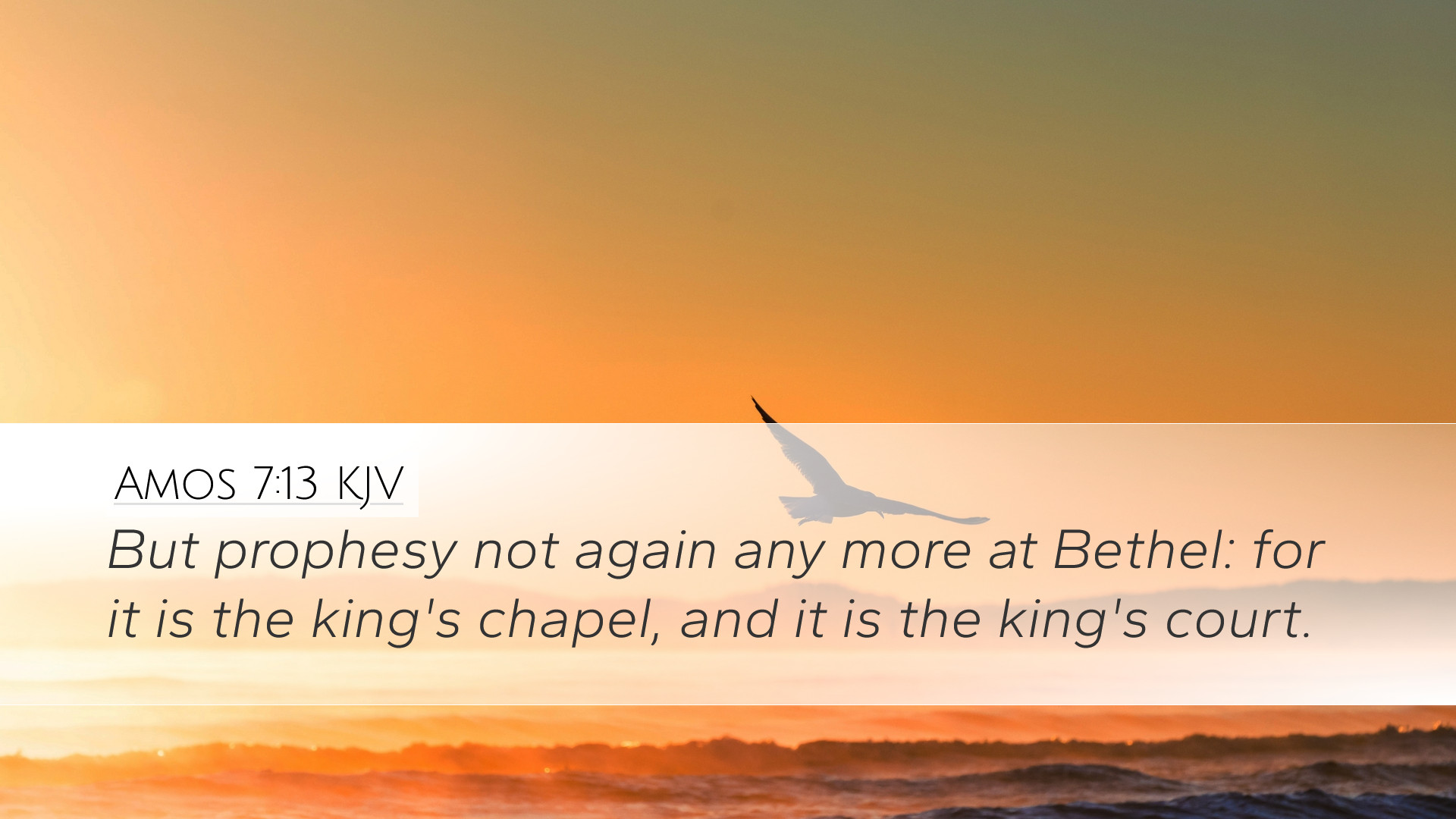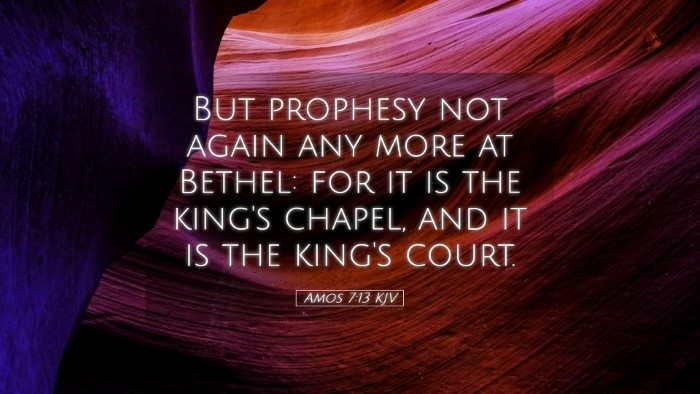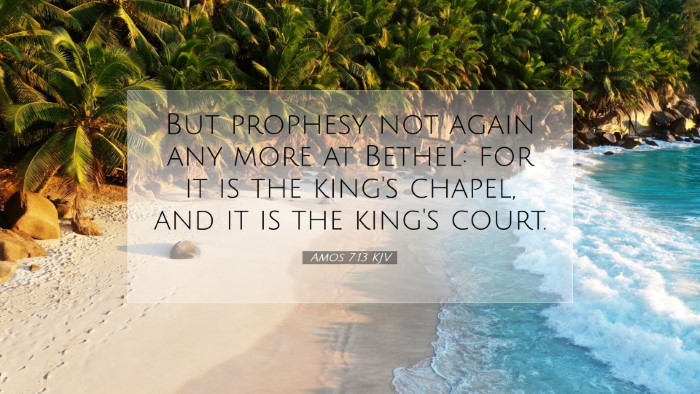Old Testament
Genesis Exodus Leviticus Numbers Deuteronomy Joshua Judges Ruth 1 Samuel 2 Samuel 1 Kings 2 Kings 1 Chronicles 2 Chronicles Ezra Nehemiah Esther Job Psalms Proverbs Ecclesiastes Song of Solomon Isaiah Jeremiah Lamentations Ezekiel Daniel Hosea Joel Amos Obadiah Jonah Micah Nahum Habakkuk Zephaniah Haggai Zechariah MalachiAmos 7:13
Amos 7:13 KJV
But prophesy not again any more at Bethel: for it is the king's chapel, and it is the king's court.
Amos 7:13 Bible Commentary
Commentary on Amos 7:13
Text of the Verse: "But prophesy not again any more at Bethel: for it is the king’s chapel, and it is the king’s court."
Introduction
The Book of Amos is a critical work in the prophetic literature of the Old Testament, commissioned by God to convey messages of judgment and hope. Amos 7:13 features prominently in the narrative as it captures a pivotal confrontation between Amos, a shepherd-prophet, and the priest Amaziah. This verse highlights the tension between prophetic authority and worldly power, as well as the challenges prophets often face. The teachings from public domain commentaries, particularly those by Matthew Henry, Albert Barnes, and Adam Clarke, provide a rich tapestry of understanding regarding this passage.
Analysis of Amos 7:13
-
Contextual Background
Amos prophesied during a time of prosperity in Israel, which ironically was the backdrop for severe social injustices and moral decay. As a shepherd and sycamore fig farmer, his status was lowly, yet God called him to deliver His message to the affluent and powerful. Verses preceding Amos 7:13 discuss visions of judgment, setting the stage for the confrontation that follows.
-
Amaziah's Prophetic Opposition
Amaziah, the priest of Bethel, represents the status quo and the institutionalized religion of the time. His command to Amos not to prophesy further illustrates the resistance by religious leaders to divine warnings. Matthew Henry notes that this resistance arises from a fear of losing influence and control, revealing a stark contrast between true prophetic authority and corrupt religious institutions.
-
The Significance of Bethel
Bethel was a significant religious site for the northern kingdom of Israel, strategically chosen by Jeroboam I as a center for worship. It served as a place where political and religious power converged. Albert Barnes points out that the emphasis on Bethel as "the king's chapel" indicates a conflation of state and religion, where the prophetic voice was silenced for the sake of political stability.
Thematic Insights
-
Conflict Between Prophecy and Power
The muted voice of prophets under political pressure is a recurring theme throughout the scriptures. Adam Clarke emphasizes that true prophets often face hostility from those in power when their message threatens to undermine the prevailing order. This verse serves as a poignant reminder of the cost of prophetic ministry.
-
The Role of the Prophet
Amos’s prophetic role symbolizes the voice of God amidst societal decay. His response to Amaziah clarifies that true prophecy cannot be confined or silenced by human authority. Matthew Henry articulates that no church or state can diminish the power of God's message, emphasizing that the prophet's mission transcends earthly commands.
-
Divine Sovereignty
This confrontation brings forth the theme of divine sovereignty versus human authority. God remains in control, and His word will prevail regardless of earthly opposition. The implicit challenge to those in power is a call to humility and accountability before the divine will. Albert Barnes notes that this underscores God's intent to challenge societal injustices through the prophets.
Practical Applications
-
Prophetic Integrity
Amos serves as an exemplar of prophetic integrity amidst adversity. Church leaders and congregants are encouraged to remain steadfast in speaking truth to power, even when faced with opposition. The passage resonates with present-day leaders who are called to maintain fidelity to God's message despite societal pressures.
-
Human and Divine Authority
This verse challenges believers to consider the balance between human and divine authority. In contexts where the church appears compromised by cultural or political influences, this passage calls for introspection regarding the relationship between faith and political dynamics.
-
Resistance to Marginalization
Amos's experience illustrates the marginalization of voices that advocate for justice and righteousness. It prefigures challenges faced by many marginalized communities today, calling believers to advocate for those whose voices are silenced.
Conclusion
Amos 7:13 encapsulates the struggle inherent in prophetic ministry in a world that often values power over truth. Insights gleaned from the commentaries of Henry, Barnes, and Clarke reveal the multifaceted dimensions of this confrontation, presenting timeless truths relevant for pastors, scholars, and theologians alike. As believers, it remains imperative to heed the call of the prophets, striving to maintain the integrity of God's word amidst the complexities of our socio-political landscape.


